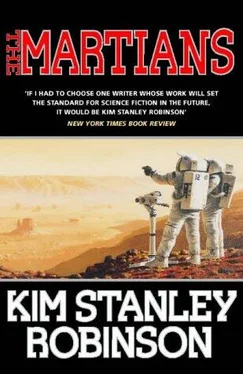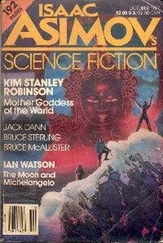3.1.3 The splitting of the global judiciary into two branches was questioned at the constitutional congress, but in the end it was decided that so many questions of environmental law lay at the heart of the Martian experience, that it deserved a special body devoted specifically to regulating that function. People at the time argued that the constitutional court was vestigial and redundant, which has not really proven to be true, as its caseload is always filled with significant problems for Martian society. People also argued that the environmental court would, because of the artificial nature of the Martian biosphere itself, become the most powerful political body on Mars. This has indeed been a much more accurate prediction, and it could be argued that Martian history since the constitution has been the story of how the environmental court has integrated its tremendous power into the rest of social life. But this is not necessarily a bad kind of history to have.
3.2.2 Legislating atmospheric pressure has made the Martian constitution the butt of many jokes, but the Grand Gesture, as it was called, to red considerations, is what allowed the constitution to be completed in the first place. And it does no harm to remind people that the environment on Mars is to a certain extent a matter of human choice. This has been true on Earth as well for almost two centuries, but only since the Great Flood has it been a truth generally acknowledged.
3.3.1 This provision attempts to chart the difficult course between local autonomy and global justice. It is the paradox of a free and tolerant society that in order for it to work, intolerance cannot be tolerated. The two injunctions “people can govern themselves” and “no one can oppress another person” must exist as a living contradiction or dynamic tension.
In practice, local laws that violate the Martian spirit of justice (as detailed in the constitution) have stuck out like sore thumbs.
3.3.2 The idea that the constitution should mandate certain kinds of economies was controversial and hotly debated at the constitutional congress, but the argument that prevailed was unassailable: Economics is politics, and a just political existence, a just life, depends on a just economic system. This being the case, the framers were not free to ignore this issue, or all their efforts would have been rendered a kind of huge gesture or joke in the face of history.
As it turns out, the establishment of a democratic participatory economy has been complicated and fraught with problems and argument, but not vicious or even particularly divisive. The old argument that “human nature” could never behave in anything but a feudal economic hierarchal manner disappeared like a mist the moment people were enfranchised in their work, and the capital created by generations of labor turned over to the ownership of the collective, and run by the people who operate it. Hierarchies still exist within each social structure, but in a context of general equality they are seen as the result of work, experience, and age rather than unearned privilege, and so they do not engender the same resentments. In other words, people are still people; argue, resent, hate, are selfish, will share only with kin or those they know, if that is what you mean by “human nature”; but are now in an economic framework where they are roughly equal to those they despise, and cannot grossly oppress or be oppressed by them, financially. This takes the sting out of anger at others, believe me. But you have to have lived under the old regime fully to feel the difference.
3.4.1 This provision provoked much hilarity during the constitutional convention, as being an afterthought body “papering over” profound contradictions in the judiciary and government as designed; it was even predicted that the whole government would eventually be run by this tacked-on reconciliation board.
Indeed this has sometimes proved to be the case. What has to be remembered is that this is not necessarily a bad thing. The fulcrum of government should be in the courts, rather than in, say, army headquarters. I have never found the debates before the reconciliation board to be anything less than fascinating: the whole philosophy of government and human nature, squabbled over in every nit-picking bureaucratic detail. Of course you may say, But this is your job, Charlotte, you like this kind of thing. But I would reply by pointing out how many people are like me, nowadays, and very much enjoy their work; which is no longer time that you give to others to earn the money to do what you want, but actually something you have chosen because you find it interesting (if you are sensible), because you are fully involved in the results of the work, and are recompensed for it in much the same ways and to the same degree as everyone else in the world, with sufficiency at least, and usually much more: This is the situation that the society based on this constitution has managed to achieve. That’s what I find so interesting about it, you see.
4.2 Again, the great paradox: intolerance of intolerance. But how else can justice be achieved?
4.4 This clause was clearly included to try to drive Martian politics down to the local and up to the global, effectively abolishing anything like the nation-states of Earth. Whether the nation-state was actually the source of Earth’s terrible problems is arguable, but no one could see why there should be any nations on Mars, and so the clause passed. No one has missed the nation-state here, and indeed when you look at the word patriotism you can see that it is not a concept Mars need concern itself with.
4.5 Making war unconstitutional; this too was laughed at by many at the convention, but passed nevertheless. Perhaps you can’t mandate goodness, but it may be worth trying anyway.
5.1.9 While controversial, this clause alone has been a major force in the struggle for equality and justice on Mars.
5.2.1 This practice was also taken from the Swiss, modified to demilitarize it and make it a matter of public work for the collective well-being of Martian society. The usual pattern has become six months after secondary education, three three-month sessions in the four years immediately after that, and nine more months on an occasional basis in the years after that. Thus the bulk of public service is done by the young and is part of their education. One study showed that over thirty percent of Martian couples met their partners during their public-service time, so if nothing else it works as mixer and matchmaker.
5.2.2 This clause encountered surprisingly little resistance at the convention. A no-brainer, Art called it.
6 Treatment of the land is fundamental to any government concerned with permaculture, that is, with stewardship of the biosphere for the good of future generations. Society is “a partnership not only between those who are living, but between those who are living, those who are dead, and those who are to be born.” (Edmund Burke.) And so we must care for the land.
7 There have been fourteen amendments passed in the twenty m-years the constitution has been law. Most reconcile contradictions embedded in the constitution, or in the local/global or tolerance situations, or refine the terraforming laws to meet current conditions.
8 Passed October 11, m-year 52, by 78% to 22%. Now operating successfully for twenty-one m-years.
At this point I believe the constitution can be judged a success. Those who argued at the time that a constitution was itself anachronistic and unnecessary did not understand its function: not to be a static “final law” wherein all social contradiction was resolved forever, but rather to be a template to structure argument, and a spur to justice. Despite the difficulties encountered since with enacting the vaguer or more radical sections of the document, I believe it has, like its great American and Swiss predecessors, succeeded in this sense.
Читать дальше
Конец ознакомительного отрывка
Купить книгу












